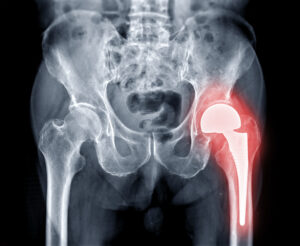A hip replacement should be a routine surgery that is completed without issue. However, healthcare providers sometimes fail to provide the standards of care we expect and the consequences of surgical errors can be very severe. So, we have created this guide to making a hip replacement medical negligence claim.
Key areas covered include the eligibility criteria for starting medical negligence cases, whether there are any deadlines for initiating hip surgery claims, and what compensation can potentially cover. You will also see some examples of how a hip replacement operation might result in a valid medical negligence claim.
Towards the bottom of this page, you’ll see a section exploring the work of our panel of expert medical negligence solicitors. They’ve helped people across the country successfully claim compensation, and we’ll show how you can also benefit.
You can contact our advisors at any time to get your free eligibility check. Talk to us today by:
- Calling 0113 460 1216.
- Completing our ‘contact us’ form online.
- Open the live chat window at the bottom of your screen.

Select A Section
- Can I Make A Hip Replacement Medical Negligence Claim?
- What Compensation Amounts Could I Get For A Negligent Hip Replacement?
- Can A Hip Replacement Payout Cover Other Types Of Damages?
- What Is The Time Limit For Claiming Hip Replacement Compensation?
- How Might Negligence Cause A Hip Replacement To Go Wrong?
- What Evidence Will I Need To Support My Medical Negligence Claim?
- How Can Medical Negligence Claims Care Help Me?
- More Information
Can I Make A Hip Replacement Medical Negligence Claim?
Yes, you can make a hip replacement medical negligence claim if you meet the eligibility requirements. Every medical professional, whether they work in a public or private hospital, a GP office, or a specialist clinic, must provide their patients with medical care that meets the correct standard.
When a failure to meet the correct standard causes a patient to experience avoidable harm, medical negligence may have occurred. You can see some examples of hip replacement medical negligence later on in this guide.
We have summarised the eligibility requirements to claim for a negligent hip replacement here:
- You were owed a duty of care.
- The correct standard of care was not provided, breaching this duty.
- This resulted in you experiencing avoidable harm.
Below, we answer a few commonly asked questions on making a medical negligence claim.
What If The Procedure Was Done Through The NHS?
If the procedure was done through the NHS, you can absolutely make a claim for compensation if you meet the above criteria. Such claims are handled by NHS Resolution, an arms-length body of the Department of Health and Social Care that acts as a kind of insurance provider on behalf of NHS trusts.
While we understand you may have reservations about pursuing compensation, frontline services won’t be affected if you make a claim. That’s because the NHS Resolution budget for paying compensation is separate from wider NHS funding.
Are All Hip Replacement Complications A Result Of Negligence?
No, not all hip replacement complications are the result of negligence. As with any medical procedure, there are potential risks to getting a hip replacement, no matter if everything goes according to plan. Moreover, procedures can still be unsuccessful even when medical professionals provide the correct standard of care.
We understand that you may want further guidance on what constitutes medical negligence. That’s why this guide will shortly take a look at several scenarios where a patient may have grounds to make a medical negligence claim. First, we’ll discuss whether you can claim on behalf of loved ones.
Am I Able To Claim On Behalf Of A Loved One?
Yes, you may be able to claim on behalf of a loved one in certain circumstances involving those who cannot do so on their own. These circumstances apply to children and individuals who do not possess sufficient mental capacity, as neither can claim for themselves.
In these scenarios, a litigation friend may be appointed. Through this role, any adult who meets the requirements (often a parent, guardian, or someone with a lasting power of attorney) can be granted decision-making powers over the claim.
The other instance would be medical negligence resulting in death. However, there are various eligibility requirements depending on who is making a fatal medical negligence claim, so you should reach out to our advisors for further information and guidance.
What Compensation Amounts Could I Get For A Negligent Hip Replacement?
The compensation amounts you could get for a negligent hip replacement may be influenced by several factors, such as the extent of harm suffered and the impacts on your daily life. There are 2 different heads of claim that compensation can be determined under:
- General damages: Physical and psychological harm caused by the negligent treatment.
- Special damages: Your financial losses. We’ll examine this head of claim in a later section.
Solicitors can refer to your medical documents alongside the Judicial College Guidelines (JCG). This publication sets out suggested brackets for compensation figures covering various types of harm.
We have used some of the JCG’s brackets in our table here. Please take note that this information is intended for guidance purposes only and that the top entry isn’t from the publication.
Compensation Table
| Type of Harm | Severity | Guideline Compensation | Notes |
|---|---|---|---|
| Multiple Forms of Very Severe Harm Together with Substantial Special Damages | Very Severe | Up to £1,000,000 + | Cases where multiple forms of harm are very severe and special damages, such as lost income, medical expenses, home modifications, and the need for care. |
| Paralysis | Paraplegia | £267,340 to £346,890 | Paralysis of the lower limbs. Payouts are influenced by the pain level, degree of independence and psychological impacts. |
| Pelvis and Hips | Severe (i) | £95,680 to £159,770 | Extensive pelvic fractures, such as where there has been a dislocation of the lower back joint with a ruptured bladder. Substantial lingering disabilities, such as hip deformity, impacted bladder function, and sexual dysfunction will be present. |
| Severe (ii) | £75,550 to £95,680 | Less severe than above, such as a fracture dislocation of both the ischial and pubic rami causing impotence. | |
| Severe (iii) | £47,810 to £64,070 | Can include acetabulum fractures causing degeneration and leg instability. This would require an osteotomy and make surgery for a hip replacement likely. | |
| Moderate (i) | £32,450 to £47,810 | Significant harm but a permanent disability won't be major and any risk in future won't be great. | |
| Moderate (ii) | £15,370 to £32,450 | Cases can include hip replacements or other surgeries. | |
| Lesser Injuries (i) | £4,820 to £15,370 | Bracket involves cases that feature little or no residual disability despite significant harm. Middle-upper end of bracket would include a fracture where a full recovery takes place within 2 years. | |
| Lesser Injuries (ii) | Up to £4,820 | Minor soft tissue damage with full recovery. |
What Will Be Considered When Calculating My Settlement Figure?
A few different factors will be considered when calculating your settlement figure. For instance, how much compensation for hip replacement negligence you could receive for general damages may be influenced by:
- What harm was caused.
- How serious the harm is.
- Whether or not you require any further surgery, additional treatment, or rehabilitation.
- If your mobility has been affected to the degree that you require in-home support.
- Your ability to still work and perform day-to-day activities in the same way you used to.
- What the prognosis is for a full recovery, and if that is possible.
Can I Apply For Interim Payments?
You may be able to apply for an interim payment if you’re likely to win compensation or the defendant has admitted to their liability. Interim payments let you access a portion of your compensation before the claim has been settled. They aim to help with urgent costs that arise during a claim, such as needing specialist care following hip replacement medical negligence.
Our panel of solicitors understand that interim payments can be a lifeline for individuals facing urgent costs like medical expenses during a claim. Not only can they guide you through the process, but they can help gather supporting evidence on your behalf and assist with the application itself.
In the next section, we’ll take a look at what financial losses you might be able to claim for. Of course, you can also speak to one of our advisors to discuss your own circumstances and get a free eligibility assessment today.
Can A Hip Replacement Payout Cover Other Types Of Damages?
Yes, a hip replacement payout can cover additional damages for financial losses connected to the harm suffered. Below, we have set some of the costs that could be reimbursed in a hip replacement medical negligence claim:
- A loss of earnings for time taken off work. It is also possible to claim for future lost income.
- Medical expenses such as private healthcare, physiotherapy, or prescriptions.
- Home or vehicle adaptations to improve accessibility. For instance, you may have needed to install access ramps, stairlifts, or an accessible shower in your property.
- Supportive equipment, such as wheelchairs and scooters.
- Transport costs incurred while attending medical appointments, ranging from parking fees and petrol to bus and train tickets.
You’ll need to provide evidence of any financial losses you seek compensation for, so make sure you hold onto copies of any receipts, bills, travel tickets, and your payslips. For a free eligibility assessment and to find out more about special damages, contact our team today using the details given below.

What Is The Time Limit For Claiming Hip Replacement Compensation?
The time limit for claiming hip replacement compensation is typically 3 years as per the Limitation Act 1980. Also known as a limitation period, this 3-year window for starting a claim is either counted from the date of your procedure itself or the date of knowledge. This term refers to when you would have been first reasonably expecting to connect the harm with the standard of care received.
However, the exceptions we looked at above will extend the general time limit for hip replacement medical negligence claims.
- Children will have the 3 years counted from their 18th birthday.
- Those lacking mental capacity are not subject to a limitation period at all. If their capacity returns, then the standard 3 years begin to run down from when their recovery occurs.
Of course, as also mentioned, a litigation friend may be appointed to get any claim underway before time limits can apply.
To learn more about the eligibility criteria for hip replacement claims and check if any exceptions are applicable, talk to our team today using the contact information given below.
How Might Negligence Cause A Hip Replacement To Go Wrong?
Below, we examine a few of the ways in which negligence might cause a hip replacement to go wrong.
Anaesthetist Administering Errors
You are given the wrong dose of anaesthetic, leading you to wake up during the surgery. This results in extreme physical pain and psychological distress.
Incorrect Implant Size Used
Errors in your medical records mean one of your implants is the wrong size for a double hip replacement surgery. In addition to the substantial discomfort, your uneven gait causes serious soft tissue damage, resulting in a later revision surgery.
Bones Being Fractured Or Broken During The Procedure
A surgeon operates on the wrong part of the hip joint after misreading your patient files. As a result, they cause several fractures to your pelvis while attempting to replace the joint. This failure has a serious effect on your mobility and means you need to undergo further surgery.
Nerves Being Damaged During The Procedure
During a hip replacement procedure, the incision to place the implant is made too deep, damaging the nerves connecting to your right leg. This results in temporary paralysis and a significant loss of sensation.
These are only a snapshot of the many reasons why hip replacement medical negligence might happen. You can share your experiences with our advisory team using the details provided in this guide and get a free assessment of your particular situation.
What Evidence Will I Need To Support My Medical Negligence Claim?
The evidence you will need to support your medical negligence claim has been summarised below:
- Medical records from your treatment, such as copies of your scans, test results, and patient notes. You can also use records from any subsequent treatment you had to correct the harm caused.
- Copies of any correspondence that you have concerning your hip replacement, such as letters to the hospital where the procedure happened.
- The contact information of potential witnesses so that your solicitor can reach out to them to collect statements during the claim itself.
- Any findings from the Bolam test, if applied to your case. This test involves medical professionals from the relevant field assessing the level of care given and establishing whether or not the expected standards were met.
We understand that proving a claim can be daunting, but you don’t have to face this task alone. If you work with one of the solicitors making up our panel, you can get all the help you might need with collecting evidence. You can find out more about their work and get your eligibility checked for free by talking to our advisory team today.
How Can Medical Negligence Claims Care Help Me?
Medical Negligence Claims Care can help you by providing free advice and a zero-obligation eligibility check at a time that suits you. If eligible, you’ll be put in touch with a specialist medical negligence solicitor from our panel of experts.
We work with a panel of solicitors who can provide a tailor-made service that suits your needs. They understand that every case is different, and offer a range of benefits to help give your claim the best chance of success. Here are just some of the ways the solicitors on our panel can help you:
- Organise an independent medical assessment, if required.
- Help you gather supporting evidence in order to prove medical negligence occurred.
- Negotiate with the defendant’s solicitors to get you the compensation you deserve.
- Connect you with specialists, including physiotherapists, psychologists, and occupational therapists.
- Give clear, approachable advice and answers to any questions you have.
Eligible claimants can be offered a particular No Win No Fee contract called a Conditional Fee Agreement (CFA). The CFA protects claimants from paying solicitor fees both at the start of and during the claims process. You will also not have to pay any solicitor fee if the claim fails.
If you win the claim, a success fee will be taken from your compensation. However, the percentage has a binding cap in place that restricts it to a maximum of 25% as per The Conditional Fee Agreements Order 2013. So, most of what you get will be yours to keep.
Contact Our Advisors
Contact one of our advisors today to get a free case assessment and see just why our panel of solicitors have won medical negligence compensation for clients nationwide. Talk to us by:
- Calling 0113 460 1216.
- Completing our ‘contact us’ form online.
- Open the live chat window at the bottom of your screen.

More Information
Read some of our other medical negligence claims guides here:
- Find out about claiming compensation after never events with this guide.
- Read our guide to claiming thyroid cancer misdiagnosis compensation.
- Check the eligibility criteria to claim for hospital medication errors here.
We have also provided a few external resources for more information:
- You can learn about how to complain about a service or provider on the Care Quality Commission website.
- Find out how to raise a concern with the General Medical Council on their website.
- Read the professional code of conduct for surgical practitioners on the Royal College of Surgeons website.
We fully appreciate that this is a lot of information, but we want to take a moment to thank you for reading this guide to making a hip replacement medical negligence claim.

